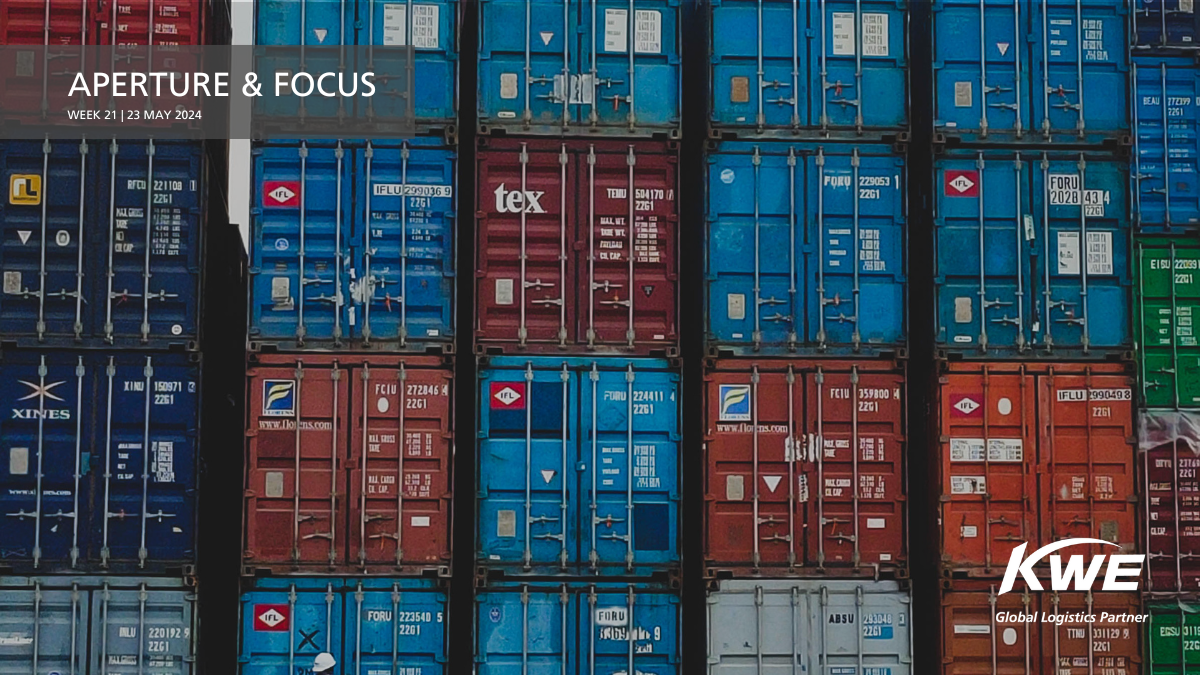Quote
Aperture & Focus: Week 21

Global Aperture
Asia-Europe services are currently experiencing a vessel shortfall of nearly 10% among the three main shipping alliances, with 36 fewer vessels available than needed due to the ongoing Red Sea crisis and rerouting challenges.
At the same time, carriers are also experiencing escalating difficulty in securing containers out of northern China according to recent reports, attributed to an unexpectedly robust market and reduced vessel capacity due to the ongoing Red Sea crisis. The scarcity of 40’ HC containers has reached a critical point, leading to intense operational challenges, including week-to-week scrambling for equipment and significant vessel waiting times at major ports like Shanghai. The situation is compounded by carrier decisions to reduce June capacities by 15-20%, further straining the logistics sector in this region.
As of this month, all liner services affected by previous limitations on Panama Canal transits have resumed their regular operations. These services, which had to reroute via the Suez Canal and the Cape of Good Hope due to the Red Sea crisis at the end of 2023, are returning to the Panama route following an increase in the number of neo-panamax transit slots— a move that will cut overall roundtrip transit times by 1-2 weeks. Despite this positive development, analysts note that the increased canal transits have not fully alleviated the tonnage shortage caused by vessel diversions, and further improvements are anticipated with additional transit slots and the restoration of normal draught limits.
Regional Focus
Americas
United States: On May 17, the US introduced the Federal Aviation Administration (FAA) Reauthorization Act, which allocates $105 billion over four years to enhance U.S. airport operations, air traffic control, and infrastructure, with $19.35 billion specifically for airport infrastructure improvements including airfreight facilities. This legislative move aims to address the longstanding cargo congestion at airports, promising to improve efficiency and capacity in air cargo handling, which is crucial for sustaining growth and operational continuity in the logistics sector.
As the potential Canadian rail worker strike looms, set to begin as early as May 22 but currently delayed due to a Canadian Industrial Relations Board review, U.S. West Coast ports are facing increased pressures as shippers reroute containers from Canada to the U.S. to pre-empt potential disruptions. This shift is compounding existing challenges, such as rate hikes and storage shortages at the Port of Norfolk due to diverted cargo from the recently closed Port of Baltimore. Further, ongoing container dwell issues at Los Angeles, Long Beach, and Seattle-Tacoma ports are impacting rail and ramp operations across the U.S., particularly affecting Midwest and Toronto areas that heavily depend on Canadian entry points.
Canada: Canadian rail operators, Canadian National Railway (CN) and Canadian Pacific Kansas City (CPKC), are facing a potential strike as negotiations with the Teamsters Canada Rail Conference (TCRC) have become contentious, with the union criticizing the companies' latest wage increase offers as inadequate. If unresolved, a strike set for May 22 could severely disrupt Canadian and North American supply chains, impacting various sectors including automotive and consumer goods, and exacerbating congestion at major Canadian ports.
Brazil: Recent rains and flooding on cargo shipments at the Rio Grande port have severely restricted cargo movement, according to the port authority, the full impact of which won't be assessable until the end of the month. While all terminals remain in operation despite the challenges, damage to food silos and crucial infrastructure have caused some traders to halt operations completely ahead of more forecasted rains until it is safe to continue.
Asia-Pacific
Indonesia: Indonesia has amended its import regulations to expedite the release of about 26,000 containers stuck at its ports, following significant backlash from businesses about disruptions to their operations. Effective immediately, the new rule exempts certain goods such as cosmetics, bags, and valves from permits, and simplifies licensing for electronic shipments, aiming to alleviate local manufacturing snarls and bolster economic credibility.
China: Increased bookings from Chinese e-commerce platforms amid ongoing Red Sea disruptions have set high expectations for demand among air carriers for the upcoming peak season. However, with air cargo demand growth in the double-digit growth over the past four months, analysts expect capacity constraints that exceed the influx of new capacity from earlier this year.
Europe, Middle East & Africa
United Kingdom: On May 20, 2024, the National Audit Office (NAO) released a study that found a number of noteworthy inefficiencies in the UK's implementation of post-Brexit border controls, leading to increased costs, administrative burdens, and significant delays in cross-border shipment traffic. These persistent issues have eroded public confidence, adversely affecting the reliability and planning of the UK’s international supply chains. In response, the UK government has said that it will spend a minimum of £4.7 billion to improve cross-border traffic performance.